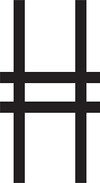A virtual speaker series
July 7–October 27, 2021
In conjunction with Sam Durant’s High Line Plinth commission Untitled (drone), High Line Art, the Surveillance Technology Oversight Project (S.T.O.P.), and the Engelberg Center on Innovation Law & Policy at NYU Law present “The Normalizing Gaze: Surveillance from Drones to Phones,” a biweekly online speaker series from July to October 2021. This series brings together artists, activists, scholars, filmmakers, journalists, and more to demystify the twinned histories of surveillance and drone warfare in the US and illuminate routine examples of surveillance in our daily lives.
Tactics & Technologies: Facial Recognition to Predictive Policing
Wednesday, July 7, 2021, 6–7:30pm ET
Artist Lynn Hershman Leeson; Kade Crockford, Technology for Liberty Program, ACLU of Massachusetts; and Ángel Díaz, Liberty & National Security Program, Brennan Center for Justice, examine surveillance systems—from those employed by US law enforcement agencies to those installed in your smartphone or home—to illuminate the software and hardware connections that follow us every day. Moderated by Albert Fox Cahn, Surveillance Technology Oversight Project.
Artificial Intelligence & Algorithms: How We Train Surveillance Tools
Wednesday, July 21, 2021, 12–1:30pm ET
Meredith Whittaker, AI Now Institute, NYU; writer, professor, and speaker Chris Gilliard, and artist Mimi Onuoha examine how artificial intelligence and algorithms are built and explore the ways that existing social relations are in fact reproduced in the computers intended to enhance objectivity.
Art, Artists, & Conflict
Thursday, September 16, 2021, 6–7:30pm ET
Artists Sam Durant, Coco Fusco, and Naeem Mohaiemen, discuss artists’ roles, responsibilities, and tactics around presentations and examinations of conflict. Moderated by High Line Art Associate Curator Melanie Kress.
Digital Sanctuary Cities: Surveillance, Immigration & Protecting Black Dissent
Wednesday, September 29, 2021, 6–7:30pm ET
Jacinta González, Mijente; Carin Kuoni, Vera List Center for Art and Politics at The New School; and Mizue Aizeki, Immigrant Defense Project discuss the labyrinthine surveillance technologies and agencies that comprise the borders of the US and how these technologies impact immigrant and BIPOC communities, awe well as everyone living within the US. Moderated by Myaisha Hayes, MediaJustice.
Building Surveillance: Three Chapters in US History
Wednesday, October 13, 2021, 6–7:30pm ET
Simone Browne, Associate Professor of African and African Diaspora Studies at the University of Texas at Austin; filmmaker and investigative journalist Assia Boundaoui; and Aliya Hana Hussain, Center for Constitutional Rights, discuss important chapters in US surveillance history: the early colonial era, FBI surveillance in the 1970s–1990s, and NYPD and federal surveillance after 9/11. Moderated by Lilly Irani, Associate Professor of Communication & Science Studies at University of California, San Diego.
Public Health, Vaccine Passports & Surveillance
Wednesday, October 27, 6–7:30pm ET
This conversation explores the tensions between privacy and public health surveillance, following the contours of both contemporary and historical debates.
In addition to “The Normalizing Gaze,” the High Line will present free public programming to contextualize Untitled (drone), including a second speaker series in 2022, organized with Arthur Holland Michel and presented with the Vera List Center for Art and Politics at the New School; workshops; and a series of online audio portraits, interviews with individuals whose personal experiences speak to the impacts of drones and surveillance, produced by Gilded Audio. Additionally, High Line Art has produced an artist’s zine designed by Alejandro Delcosta that maps the history and uses of drones and domestic surveillance. The artist’s zine, links to related resources, and more information about our advisors are available here.
Public engagement for Untitled (drone) is organized by Melanie Kress, High Line Art Associate Curator, and has been developed in consultation with an advisory group of experts, including Center for Constitutional Rights, Immigrant Defense Project, MediaJustice, Mijente, Mpower Change, Reprieve, and the Surveillance Technology Oversight Project (S.T.O.P.).


